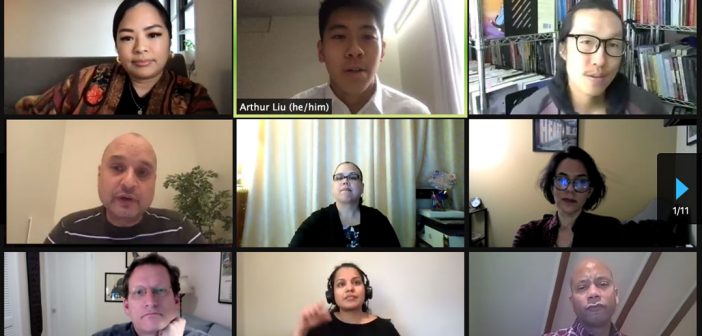Jennie Park-Taylor, Ph.D., recalled how her sister-in-law, who like her is Korean American, was recently assaulted on the train. Though she wasn’t severely harmed, she was scared and frightened, and no one came to help her.
“I think that part was the most painful for her. When I think about it, it’s really painful for me to think that something had happened to somebody I love, and nobody would stand up,” said Park-Taylor, an associate professor of counseling psychology and a director of training in the Graduate School of Education.
Park-Taylor shared this story as a part of a virtual community convening on anti-Asian violence and racism on March 24, which brought together more than 200 members of the Fordham community. Throughout the COVID-19 pandemic, anti-Asian bias, attacks, and harassment have been on the rise. Stop AAPI Hate, a nonprofit, documented almost 3,800 hate incidents against Asian Americans and Pacific Islanders from March 2020 to February 2021. Most recently, six Asian American women were murdered in Atlanta.
Members of the Fordham community, including Park-Taylor; Mary Balingit, associate director for diversity initiatives in the Office of Admissions; Arthur Liu, a Fordham College at Rose Hill sophomore and president of Fordham’s Asian Cultural Exchange; and Stephen Hong Sohn, Ph.D., professor and Thomas F.X. and Theresa Mullarkey Chair in Literature, along with moderator Rafael Zapata, chief diversity officer and special assistant to the president for diversity, reflected on the impact of anti-Asian violence. They discussed ways to build community and heal, and talked about possibilities for interracial solidarity.
“I think what’s a little bit different about this moment is just the level of fear that I’ve heard communicated,” Sohn said. “It’s been higher than I’ve ever anecdotally seen before, and the circumstances coming out of COVID make the experience slightly unique as well.. But I think it’s important for us to realize this is part of a longer historical genealogy of anti-Asian sentiments that has reemerged in light of these circumstances.”
Liu, who is originally from Hong Kong, said that he “thinks fondly of the United States,” but that he had to convince his friends back home that many Americans weren’t like the political leaders who were making anti-Asian remarks.
“The political rhetoric surrounding COVID-19 and what Donald Trump has said—what he said was incredibly hurtful,” Liu said.
He also said he had friends ask him if he was considering taking martial arts classes to learn how to defend himself in case he was attacked.
“You shouldn’t have to feel the need to know how to defend yourself in a civil society,” he said. “And so I was taken aback by that initially, but honestly, I’m kind of buying into the idea, because I just feel a heightened sense of awareness and being scared.”
That sense of awareness is something that Park-Taylor said she has personally grappled with.
“When I think about the experiences of racism I’ve gone through throughout my life, I can think of it as this duality—sometimes I feel really invisible. I feel like I’m not seen at all, I’m not heard and silenced,” she said. “But then there are times when I feel hyper visible. There were (times when) I’m the only Asian person in a classroom. Or instances where I’m particularly targeted because I’m an Asian woman and [because of]the stereotypes about Asian women.”
Balingit said those negative stereotypes, which have been perpetuated throughout history, were on display when the Asian women were killed in Atlanta.
“That shared experience of being an Asian woman—the negative stereotypes that say that we’re docile, and that we’re quiet, we’re apolitical, and that we are weak—I think that played into that, and to what happened last week in Atlanta,” she said.
Park-Taylor said that she hoped people now have a better understanding of microaggressions and intersectionality.
“There’s a unique positionality that an Asian woman occupies in this place and space,” she said.
Balingit said that solidarity between minority communities is essential to combating these acts and other types of racism and white supremacy.
“I think what’s important is look at the history—we have to look at the history of our solidarity first, and to Rafael (Zapata’s) point is how everything is rooted mainly in white supremacy and how this perpetuates the pitting of minorities against each other,” she said. “Let’s not let this divide us even more, especially at a time like now where we’re also very isolated already.”
Zapata also stressed the importance of bystander intervention, and noted there are trainings on the topic, such as the one offered through Hollaback!, a global movement to end harassment.
“We had been working on a panel on this issue just as the murders in Atlanta took place, which was especially devastating, and made clear for all to see what far too many AAPI people in the U.S. had been experiencing at higher rates since the beginning of the pandemic,” Zapata said. “It also made participating in the panel more of a challenge, because of the emotional toll it could take on participants. I’m so grateful to the panelists for all they shared.”
For students, staff, and faculty, who might be struggling to handle anti-Asian hate and violence, Fordham’s Counseling and Psychological Services put together a resource sheet.
Jeffrey Ng, Psy. D, director of Fordham’s Counseling and Psychological Services and a licensed clinical psychologist, encouraged those in attendance to be there for their friends, families, and colleagues who might be dealing with acts of discrimination and racism.
“The immediate thought that comes to my mind is just to take the time to listen is so important, to try to be present and to be attuned to what your POC students or colleagues or peers might be sharing with you,” said Ng, who will be moderating a second community convening on March 29. “The validation and the affirmation is so critical for the healing process.”



